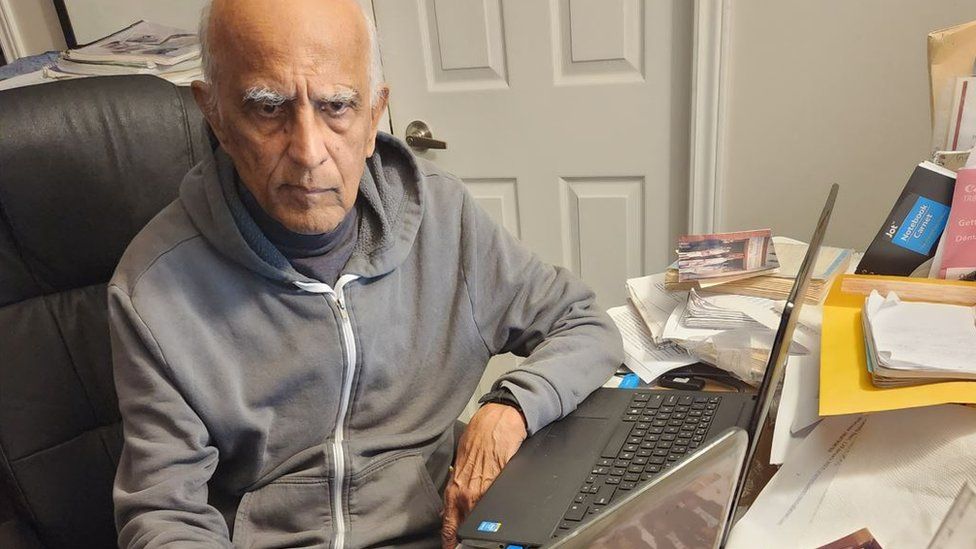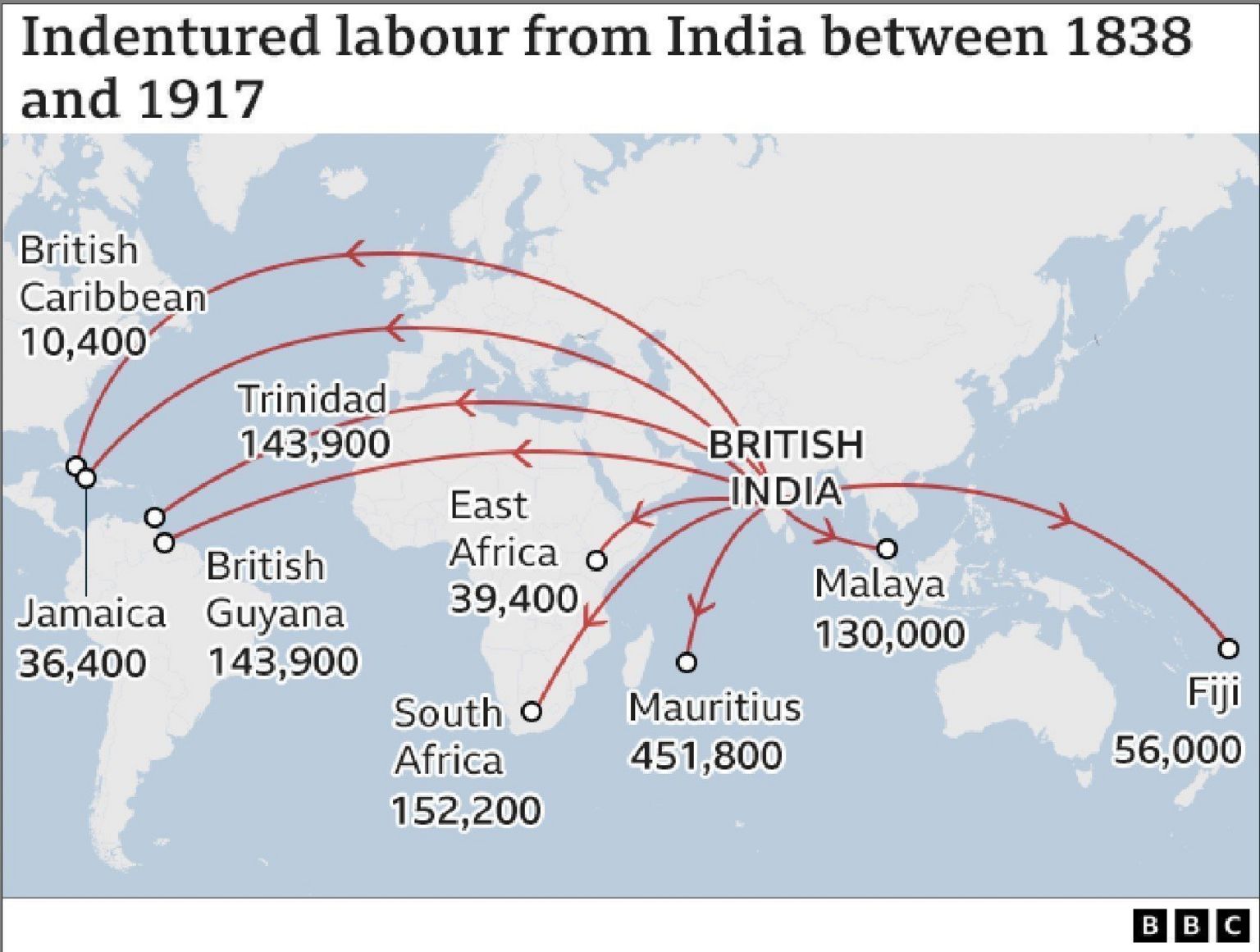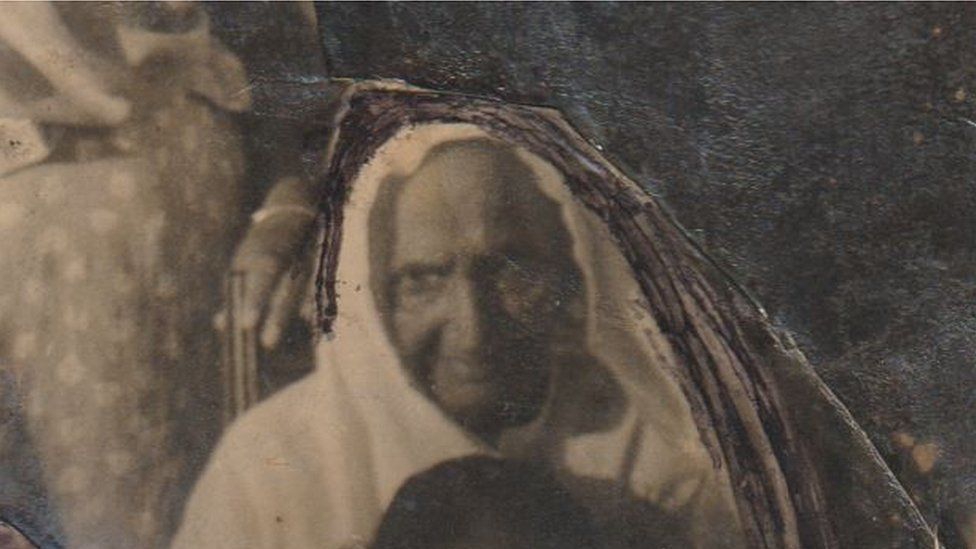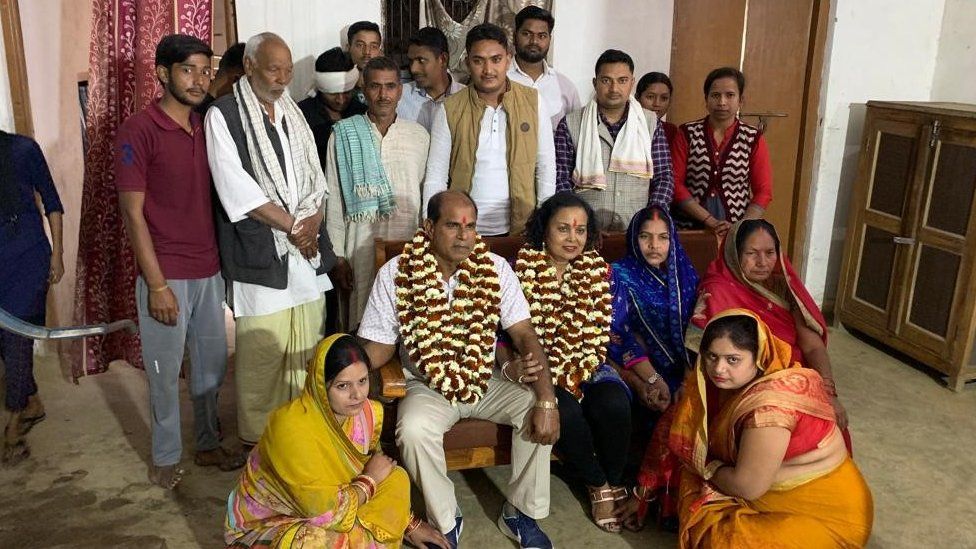
 Shamshu Deen
Shamshu Deen “I really feel very emotional and elated once I discover a lacking household. It additionally offers me a way of accomplishment,” Shamshu Deen says.
For the previous 25 years, Mr Deen, 76, a resident of Trinidad and Tobago, has been serving to households within the Caribbean discover long-lost kinfolk in India. He says he is helped over 300 folks to date.
The ancestors of those folks arrived within the Caribbean – a former British colony – as indentured labourers within the 1800s and early 1900s, however misplaced contact with their households again dwelling over time.
Mr Deen – a geography instructor turned geologist – is now serving to the descendants of Indian indentured labourers within the Caribbean hint and reconnect with their family members.
Throughout British rule in India, generally known as the British Raj, slavery had been abolished. However indentured labourers had been used as “low cost labour” throughout the British Empire in response to a so-called labour scarcity.
Many Indians travelled from their nation to British colonies just like the Caribbean, South Africa, Mauritius, and Fiji to work on sugar plantations between 1838 and 1917.
Regardless that most labourers went willingly – presumably as a result of they weren’t totally conscious of the situations they’d face or signed agreements once they had been illiterate – others had been forcibly taken overseas.
Some historians even described the system of indentured labour because the “new slave commerce”.

Mr Deen grew to become inquisitive about this method and the affect it had on households after he learnt that his grandfather’s grandfather – Munradin – had travelled to the Caribbean as an indentured labourer.
He was at school when he learnt that the land his home was constructed on had been bought by Munradin.
“No-one within the household might inform us any extra about him,” Mr Deen says.
In 1972, Mr Deen went to the Purple Home in Trinidad – which subsequently grew to become the ministry of authorized affairs – and sifted by piles of paperwork trying to find the thriller man.
After about 4 hours, he discovered his title on the final web page of a moth-eaten e-book.
He learnt that Munradin had left Calcutta (now Kolkata) on 5 January 1858 and reached Trinidad on 10 April the identical yr.
“We all know he was educated and spoke English. Munradin labored on sugar plantations. Later, he began doing translation work. After ending his indentured contract, Munradin went on to turn into a instructor and eventually opened two retailers. He had two wives and 5 youngsters. The home he lived in was inherited by his youngsters however was destroyed in a hearth.”
Mr Deen finally additionally discovered relations from his mom’s ancestry and will reconnect with kinfolk of the final individual in his household to journey to the Caribbean, Bhongee.
She arrived in Trinidad in 1872 on the age of seven, accompanied by her mother and father and three siblings.
“I’ve just one photograph of Bhongee, who died in 1949 once I was three years outdated. She lived to see her great-great-grandchildren,” Mr Deen says.

Mr Deen went on to turn into a geography instructor however his success find misplaced kinfolk caught the attention of the Indian Excessive Fee in Trinidad. It gave him a scholarship to hint the kinfolk of 10 Hindu and 10 Muslim households.
He would later make this his profession, changing into a genealogist and getting paid to do the work with the assistance of analysis groups in each Trinidad and India.
A few of the household reunions he has helped facilitate embrace that of two former prime ministers of Trinidad and Tobago, Basdeo Panday and Kamla Persad Bissessar.
Mr Deen additionally helped Trinidad-based David Lakhan, 65, discover out extra about his great-grandfather, who travelled from India to Trinidad in 1888 when he was 22.
“He simply gave one title in a doc – Lakhan. However I wished to find the power and resilience behind his determination to journey such a protracted distance,” Mr Lakhan tells the BBC.
From the nationwide archives, Mr Deen was in a position to dig up emigration paperwork which had the title of Mr Lakhan’s great-grandfather’s brother, father, caste and his village.
He then used his contacts in India to hint Mr Lakhan’s kinfolk, paving the best way for a household reunion in India in 2020.
“We did not count on the entire village to come back out and greet us. They garlanded us,” says Mr Lakhan’s spouse, Geeta.
The household has since stored in contact with a lot of their Indian kinfolk, utilizing translation instruments to beat language obstacles. Ms Lakhan stated she finds many similarities with them due to the cultural data handed on by their widespread ancestors.
They’re now feeding the curiosity of their 7-year-old grandson by telling him about their journey to India, within the hope that he’ll take an curiosity in his heritage.

Mr Deen says that tracing folks right this moment is a bit simpler than it was initially of his profession on account of digital maps and higher entry to historic data, however challenges stay. He estimates that he has about an 80% success charge in each case.
“I can not get everybody’s ancestry. In some instances, flawed info was given within the paperwork,” he explains.
Additionally, some indentured staff died whereas making their journey to Trinidad. Those that managed to succeed in typically lived in dire situations, their lives by no means being documented in any official method.
However many staff additionally voluntarily stayed again in Trinidad after the tip of their contract and had been in a position to reside as free folks, he says.
Mr Deen says he does not need to hand over his work despite the fact that he has retired. The truth is, simply after he retired, he went to India for six months in 1996, and tracked down 14 extra households.
He says the work he does nonetheless offers him “happiness and well being”.
“Each case is a puzzle. No two instances are the identical,” Mr Deen says.
“Like all humankind, we’re all migrants. However the thread of Indian heritage is sewn deeply in us.”
BBC Information India is now on YouTube. Click on right here to subscribe and watch our documentaries, explainers and options.

Learn extra India tales from the BBC:
- India police file rioting case towards prime wrestlers
- Why prosperity cannot break India’s dowry curse
- The Indian girl who writes exams for others who cannot
- Who’re India’s subsequent cricketing stars?
- The unbelievable lifetime of India’s ‘first’ girl wrestler

Associated Subjects
- Trinidad and Tobago
- Caribbean
- Asia
- Colonialism
- India
Adblock check (Why?)